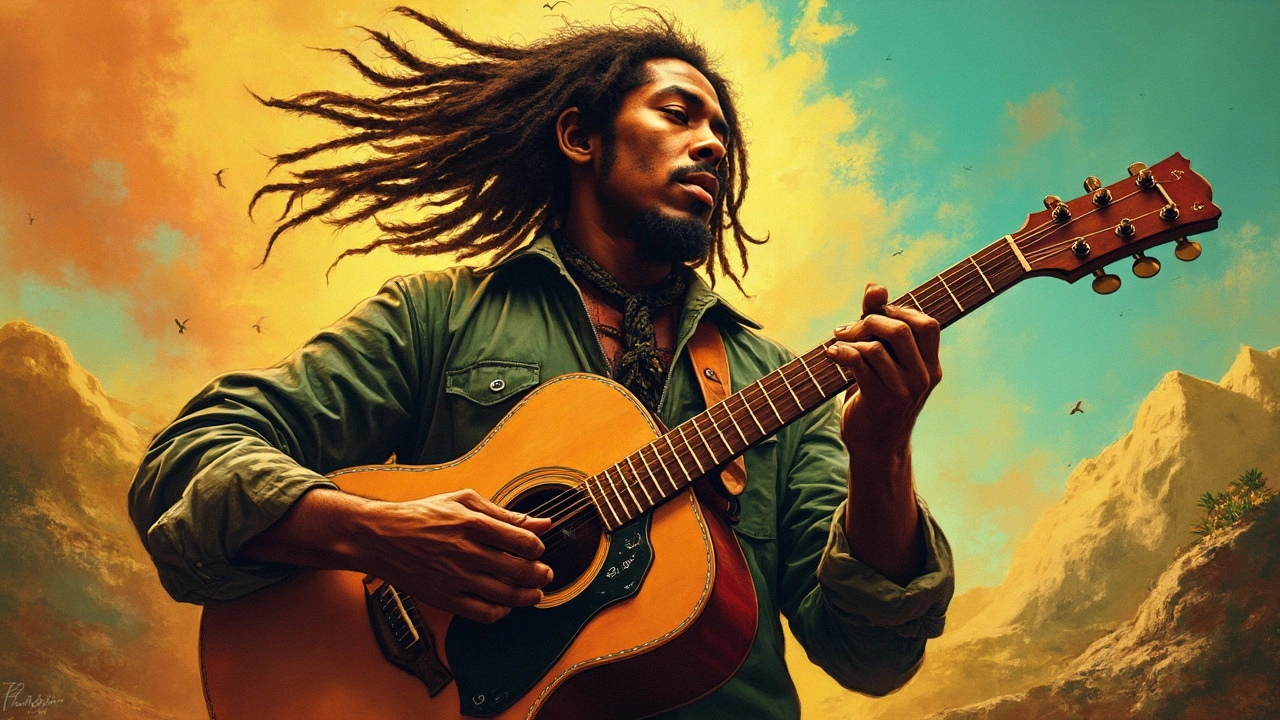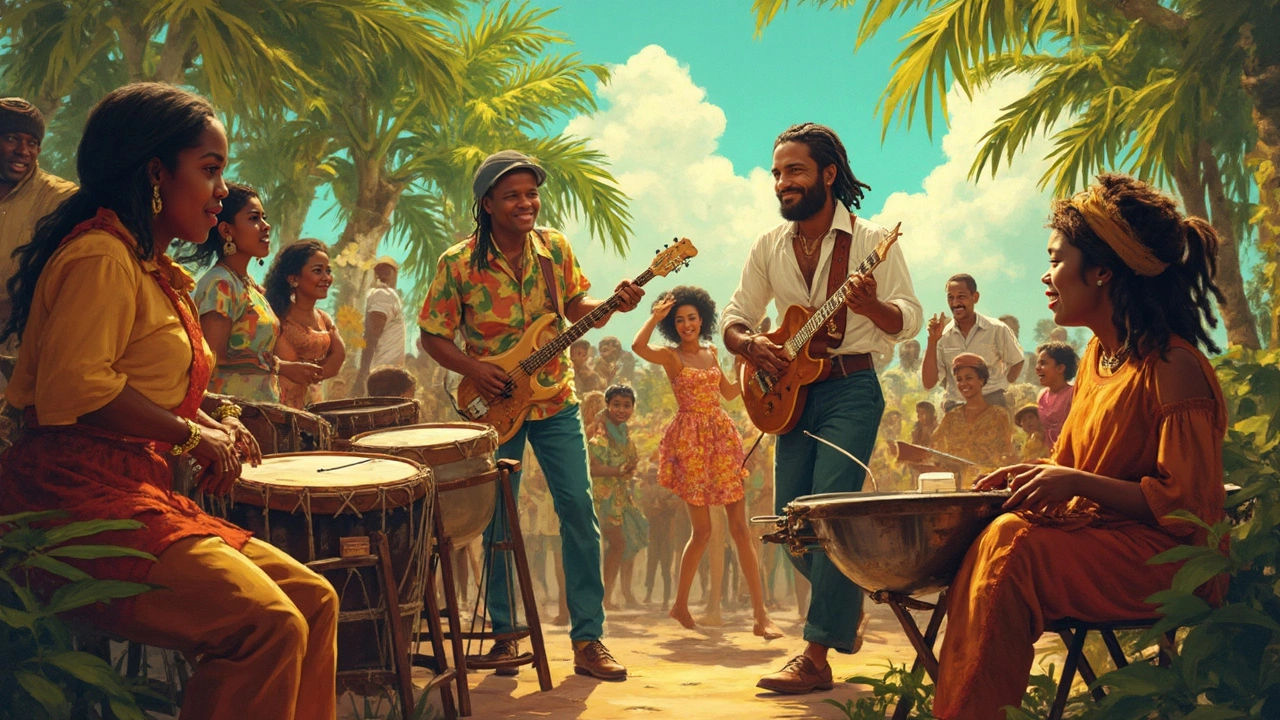Reggae music has this magical way of making you feel like you're chilling on a sun-soaked beach, even if you're stuck at your desk in the middle of winter. But where did this chilled-out music style come from? It all kicked off in Jamaica in the late 1960s. At first, it was a mix of mento (a local Jamaican music style), ska, and rocksteady. The name 'reggae' might have come from the word 'streggae,' which was a slang term for a scruffy person, but the music is anything but sloppy. It's rhythm-driven with an irresistible groove.
One of the most fascinating things about reggae is how it went from tiny island vibes to a full-blown global phenomenon. And who can talk about reggae without mentioning Bob Marley? This guy not only took reggae international but also became a symbol of peace and unity, even long after his time. Thanks to Marley and his band, The Wailers, reggae broke through language and cultural barriers, reaching fans everywhere.
- Roots of Reggae
- Rise of Bob Marley
- Reggae's Global Influence
- Evolution Over the Decades
- Notable Reggae Artists
- Reggae Today
Roots of Reggae
Alright, let's take a step back and explore how reggae music got its start. Picture Jamaica in the late 1960s—a place bubbling with creativity and change. This island had a rich mix of cultural influences, thanks to its history of colonization and its melting pot of African, European, and Caribbean traditions.
Paving the way for reggae were genres like mento, ska, and rocksteady. Mento was a kind of folk music filled with local stories, often accompanied by guitars, banjos, and hand-played drums. Then came ska, which blended Caribbean mento rhythms with jazz and rhythm and blues influences from the United States. Following ska, rocksteady slowed things down a bit with its steady beat and smooth vocals.
But reggae really found its groove, introducing a distinctive rhythm with a laid-back emphasis on the second and fourth beats of the measure, which gave it that chilled-out vibe we can't get enough of. The bass guitar took center stage, providing deep, resonant sounds that carry the whole tune. And let’s not forget the crucial role of social and political messages—reggae talked about real issues like inequality, poverty, and love, resonating with folks everywhere.
One thing that helped reggae stand out was its grassroots approach. Local sound systems—basically mobile discotheques—would tour neighborhoods, bringing the music directly to the people. These events were more than just jam sessions; they were cultural gatherings and a starting point for many future reggae stars.
Thanks to pioneering artists and producers, such as Lee "Scratch" Perry and Clement "Coxsone" Dodd, reggae began to take shape. Their innovative recording techniques and knack for finding talent pushed reggae to new heights. By the 1970s, reggae was ready to take on the world, thanks to its raw authenticity and universal appeal.
Rise of Bob Marley
Alright, so here's the deal: you can't really talk about reggae music without diving into the story of Bob Marley. The guy basically put reggae on the world stage! Born in 1945 in a small Jamaican village called Nine Mile, Marley moved to Kingston as a kid, which is where the magic started happening.
In 1963, he formed a group named the Teenagers, which later became known as The Wailers. The band initially had a ska vibe, but as they evolved, they found their signature reggae sound. Fast forward to the early 1970s, Marley and his band signed with Island Records. This was huge because it gave Marley the opportunity to record with more advanced equipment and reach an international audience.
The 1973 album, 'Catch a Fire,' was the turning point. It was the first reggae album to be treated like a rock album. They went out on an extensive tour, opening up for big rock bands, and it worked. Bob Marley's charisma on stage and his songs, full of hope and resistance, resonated with people everywhere.
His 1975 hit, 'No Woman, No Cry,' became an anthem, but it was his 'Legend' album, released posthumously in 1984, that cemented his legacy. It's one of the best-selling reggae albums of all time. Marley was more than just a musician. He was a cultural icon, blending music with a message of peace, love, and social justice.
Marley's influence stretched beyond music. He made reggae synonymous with Jamaican culture and Rastafarian beliefs, propelling both into the global consciousness. Despite passing away in 1981, his impact is ongoing. Bob Marley isn’t just the face of reggae; he's the heartbeat of it.
Reggae's Global Influence
It's pretty wild how reggae, starting from the small Caribbean island of Jamaica, weaved its rhythms into the world's cultural fabric. We're talking about a music style that isn't just about catchy beats, but also about carrying messages of social justice, unity, and hope. This universal appeal is what propelled reggae into the global spotlight.
Bob Marley’s influence was pivotal. His songs like 'One Love' and 'No Woman, No Cry' became anthems for peace and advocacy all around the globe. Bono from U2 once said, "Bob Marley was like an eruption of hope and truth." That's big talk but dead accurate when you look at reggae’s impact far beyond Jamaica.
Let's not forget about how reggae has influenced other music genres. Hip-hop, punk, and even some modern pop sounds carry deep traces of reggae rhythms. Artists like Eric Clapton and The Police have openly embraced reggae vibes, integrating them into their hits. Doesn't matter if you're on a crowded London street or chilling in a Buenos Aires cafe—reggae's pulse is there.
"Everywhere reggae went, it left behind seeds of inspiration, encouraging people to demand more justice, more peace, more positivity." – Music historian David Katz.
Reggae festivals now pop up worldwide, from Rototom Sunsplash in Spain to Reggae Sumfest in Jamaica, drawing thousands of fans each year. These gatherings aren't just about jamming to good music but sharing a vibe and connecting over thoughts and ideas that reggae stands for.
| Country | Popular Reggae Festival |
|---|---|
| Spain | Rototom Sunsplash |
| Jamaica | Reggae Sumfest |
| Germany | Reggae Jam |
So, next time you find yourself bobbing your head to that reggae beat, remember, it's more than music. It's a movement that keeps growing, spreading positivity and energy across every corner of the world.

Evolution Over the Decades
Way back when reggae first popped onto the scene, it was like a breath of fresh air, mixing distinct Jamaican sounds with heartfelt lyrics. But this isn't where it stopped. Over the decades, reggae kept transforming, picking up influences and growing into something even bigger.
In the 1970s, thanks largely to the iconic Bob Marley, reggae became a voice for social change and unity. Marley's music often tackled issues like poverty and oppression while urging listeners to embrace love and peace. His work gave reggae a deep, meaningful angle that resonated across cultures.
The 1980s saw the rise of sub-genres like dancehall, which put a more electronic spin on classic reggae. Artists like Shabba Ranks and Yellowman brought a fresh, upbeat tempo to reggae, making everyone want to get up and dance. At the same time, artists kept the roots of reggae alive, ensuring the essence of the music stayed true.
By the 1990s, reggae was a global staple. You had artists from all corners of the world borrowing its beats and vibe. Reggae fusion was born, combining reggae rhythms with elements from rock, hip-hop, and even pop. Bands like No Doubt and artists like Shaggy made reggae-infused hits that topped the charts.
In today’s music scene, reggae hasn't shown any sign of slowing down. Modern reggae artists like Chronixx and Protoje have brought a new energy while staying connected to reggae's rich roots. Whether it's through collaborating with international stars or branching into new genres, reggae continues to evolve and inspire new generations.
Notable Reggae Artists
When it comes to reggae, it’s hard not to immediately think of Bob Marley. This guy didn't just make reggae music; he made history. Back in the day, Marley and The Wailers took reggae beyond Jamaica, blending political themes with universally relatable ones. Marley’s songs like 'No Woman, No Cry' and 'Redemption Song' are classics that still resonate with people worldwide.
Besides Marley, there's Peter Tosh, another member of The Wailers who made a name for himself. Tosh was known for his strong advocacy for equality and justice, echoing in songs like 'Get Up, Stand Up' and 'Equal Rights.' His work with Mick Jagger and Rolling Stones added a rock flavor that broadened his appeal beyond reggae fans.
Jimmy Cliff is another huge name. His role in the film 'The Harder They Come' introduced reggae to an international movie audience. The soundtrack was filled with hits, and his song 'Many Rivers to Cross' is simply unforgettable.
Don’t forget about the woman power in reggae! Rita Marley, Bob's widow, has kept the Marley legacy alive, both in music and through her charitable works. Then there’s Marcia Griffiths, whose track 'Electric Boogie' got the whole world dancing the Electric Slide at weddings and parties everywhere.
Fast forward a bit, and we’ve got artists like Damian Marley (yep, Bob Marley’s son) keeping the family torch blazing. His fusion of reggae with dancehall and hip-hop in albums like 'Welcome to Jamrock' proves reggae's evolving nature.
Today, artists like Chronixx and Protoje are redefining reggae, blending roots with modern styles while keeping the essence intact. Their success shows that reggae is far from just a historical genre—it's very much alive and evolving.
Reggae Today
Reggae music has come a long way from its roots in Jamaica. Today, this genre is celebrated worldwide for its catchy rhythms and profound messages. You can still feel the heartbeat of classic reggae in modern artists, but they're also bringing something fresh to the table. From artists like Chronixx to bands like Rebelution, reggae keeps reinventing itself.
What's cool is how reggae has branched out into sub-genres like dancehall and reggae fusion, taking inspiration from hip-hop, pop, and electronic music. This evolution makes reggae accessible to a whole new generation while keeping its ties to the past. People across the globe are jamming to reggae beats on streaming platforms, where it's easier than ever to discover new hits and old classics alike.
One more fun fact: there's a whole bunch of reggae festivals around the world, attracting huge crowds and big-name performers. These festivals are not just about the music. They celebrate the rastafarian culture, offering a blend of music, food, and art. Whether you're in California or Japan, you'll find die-hard reggae fans and loads of tricks to learn from the pros.
Reggae today isn't just about the sound—it's a lifestyle. It's about peace, love, and unity, values that are pretty universal if you ask me. Because of the internet, reggae is as much online as it is on the streets of Kingston. People are creating, sharing, and remixing tunes like never before. All these factors make reggae a genre that feels both timeless and brand new at the same time.

